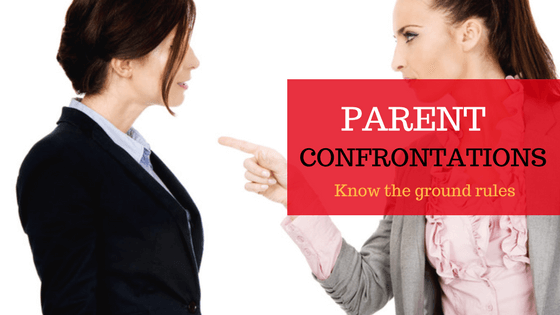As parents, you want what’s best for your children. Sometimes, this means you become frustrated with decisions made by other parents: perhaps they sent their sick child to school and that child ended up getting your child sick. It might be behavioral; they taught your child a bad word or an unacceptable behavior that your child is now using. Worse still, another child could bully your child.
Which begs the question: Are there ever circumstances under which it is okay to confront another parent? And if so, how should it be done?
First, determine whether a confrontation should happen
To do so, consider the following factors:
Severity of the Issue
How big of a deal is this? Confronting another parent is, at best, awkward and, at worst, can spiral into a major feud that affects both children and the school personnel. Before you confront a parent, think about whether the issue will really matter in the long run.
For example, if your child learned a word that is not allowed in your household but holds no deep significance, (for example, the word “butt”) from another child, it’s probably not worth confronting the parent. On the other hand, if your child learned a word or phrase that has deeply negative connotations, such as a racial slur or some other type of racist or sexist language, it may be worth a conversation.
Permanence of the Issue
Along the same lines of severity is permanence. If another child gave your child a head cold that lasted for 2 days, it may be worth chalking it up to the hazards of childhood and moving on. On the other hand, if the child came to school with a major disease that got your child sick for weeks on end, it’s worth considering a confrontation.
When behavioral issues strike, talk with your child first about appropriate and inappropriate behaviors. Some bad words are fun for a few days but then the novelty wears off. If your child is still exhibiting the bad behaviors even after time has passed and you’ve had a conversation about it, you could consider talking with the other parent.
Involvement of School Personnel
Another factor to consider is whether teachers or other school employees can help facilitate the discussion or just handle it entirely. In terms of behaviors that are exhibited at school, a better course of action may be to contact your child’s teacher and have him or her raise the issue with the student and parent.
Many schools have policies for sick students that leave them in school as long as they don’t have a fever or vomiting, so the fact that your child got sick may be well within the realm of school policy. Make sure you check on this with your child’s teacher before contacting another parent to make sure you have your facts straight.
Read these ground rules.
If, after considering the previous factors, you decide a confrontation is necessary, it’s important to make sure you proceed in a productive way. Here are some ground rules:
Be solution-oriented.
The best way to begin a conversation with another parent is to be on the same team: the team that wants the best for their kids. If you keep this mindset and keep the conversation focused on solving the problem, the other parent will be much less likely to get defensive and the situation is less likely to escalate.
Keep it civil.
Check your tone: make sure you’re not screaming. Practice phrasing your concerns in the form of “I” statements like “I am concerned about the health of my child and other children when your child comes to school sick.” Again, this will decrease the defensiveness on the other end and help the other parent really hear what you’re saying.
Keep it private.
If at all possible, organize this meeting with your child’s teacher or another school administrator present to help mediate and clear up any policy confusion. Never confront a parent in front of your children or other children, and definitely don’t gossip about the issue to other parents or post about it on social media.
A last resort.
Confrontation with another parent should always be a last resort. If you determine that a confrontation is necessary, make sure it’s constructive, respectful, and private. This will help ensure a productive discourse and a better learning environment for everyone’s child!



